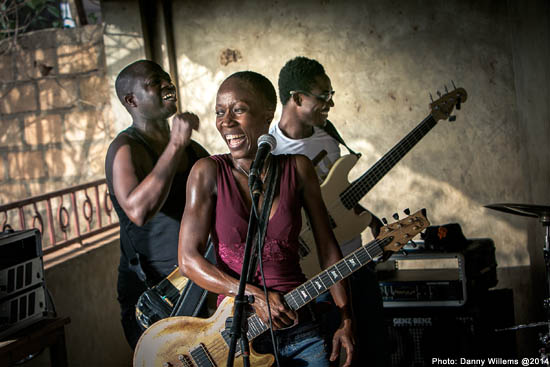|
Rokia Traoré
|
|

Rokia Traoré
Home is very obviously at the heart of Né So, with songs that dig deep into the meaning of homeland, rootedness and the loss of both. These songs spring both from Traoré's own personal experience — as a diplomat's daughter she grew up traveling between her father's various postings — and from the ongoing civil strife in Mali, which has displaced hundreds of thousands of Malians from their homes and led to many to question the viability of the State itself. It's a lot of weight to carry, but Traoré delivers beautifully, thanks, in part, to producer John Parish (known for his work with PJ Harvey), who helps Traoré find the sweet spot between Bambara tradition and rock swagger. It didn't hurt to have a bona-fide Rock God like Led Zeppelin's John Paul Jones, or alt-psych folk freak Devendra Benhart onboard for some songs, either. Traore's own band is pretty impressive, too, a transnational squad made up of Italian guitarist Stefano Pilla, Congolese guitar hero Rodriguez Vangama (who also graced Baloji's debut), Burkinabe drummer Moïse Ouattara, Ivorian bassist Matthieu N'guessan, and Malian ngoni player Mamah Diabaté. Their spare, stripped down, rock-ish sound is the latest stage of a musical evolution that can be traced over five records, from the staid, acoustic Malian pop of her debut, Mouneïssa, to the global rock and roll sound of 2013's Beautiful Africa. Né So's sonic template is a little more subdued; a moody, reflective, almost lo-fi sound that sets off Traore's simple, earnest vocal arrangements and urgent, direct lyrics. It's a formula that works, and even packs a few undisguised gut-punches… and it's worth noting that all of Traore's lyrics are translated and printed in full in the CD booklet. She wants her words to connect, and her punches to land.
The album kicks off with “Tu Voles”, a deceptive scorcher whose initial, jittery guitar-meets-scratchy ngoni sound dissolves into elegantly filigreed artistry, backed by powerhouse trap drumming from Moise Outara. Lyrically, it's a declaration of purpose for a knotty, gritty album that offers no easy answers: The title track, “Né So” (video below) is an undisguised call to action, confronting the listener with Mali's ongoing internal refugee crisis by directly referencing her work as a goodwill ambassador for UNHCR (the United Nations refugee agency). It's not a subtle song, but it's heartfelt and effective
Similarly, on “Kènia” Traore calls on Malians to take responsibility for their actions:
The good behavior of our Congressmen
It's not all high-minded moralizing, though. “Kolokani” praises the people of Traore's family's hometown, and “Maye” is laden with Bambara proverbs in the manner of a classic Ali Farka Toure song; a more gentle and subtle reminder of how Malians have kept their moral compass dialed in for generations. “Amor” delivers a built-in tension between Traore's breathy French vocals and a weary, almost-washed out down-tempo groove. It builds a slow groove that never fully resolves — a neat trick that anyone who's experienced love outside of a pop song will appreciate.
Traoré even tries her hand at English, on a tentatively-voiced version of Abel Meeropol's anti-lynching classic “Strange Fruit”. It's a powerful, heartfelt statement that doesn't quite muster the confidence required to sell such an iconic song. But Traoré's missteps are all the more interesting for their boldness.
She regains her confidence on the album's closing track, "Se Dan," where her English vocals are more forceful, reminding listeners that “Whoever you are, you were born unique among unique people, in a world of diversity.” While lecturing might seem like Traore's default mode, her stridency works here: it's a resolutely positive song on a profoundly tough-minded and emotionally spiky record. On Né So Traore gives us a taste of what it sounds like when global pop actually grows up. - Tom Pryor
© 2016 RootsWorld. No reproduction of any part of this page or its associated files is permitted without express written permission.
|
|
|
|